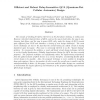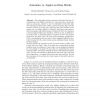24 search results - page 3 / 5 » On the Power of Quantum Finite State Automata |
DFT
2006
IEEE
13 years 9 months ago
2006
IEEE
The concept of clocking for QCA, referred to as the four-phase clocking, is widely used. However, inherited characteristics of QCA, such as the way to hold state, the way to synch...
COLING
1992
13 years 7 months ago
1992
A language-independent framework for syntactic finlte-state parsing is discussed. The article presents a framework, a formalism, a compiler and a parser for grammars written in th...
COLT
1995
Springer
13 years 9 months ago
1995
Springer
We propose and analyze a distribution learning algorithm for a subclass of Acyclic Probabilistic Finite Automata (APFA). This subclass is characterized by a certain distinguishabi...
DAM
2008
13 years 6 months ago
2008
A mobile agent (robot), modeled as a finite automaton, has to visit all nodes of a regular graph. How does the memory size of the agent (the number of states of the automaton) inf...
CSL
2010
Springer
13 years 7 months ago
2010
Springer
Abstract. The relationship between automata and logics has been investigated since the 1960s. In particular, it was shown how to determine, given an automaton, whether or not it is...


